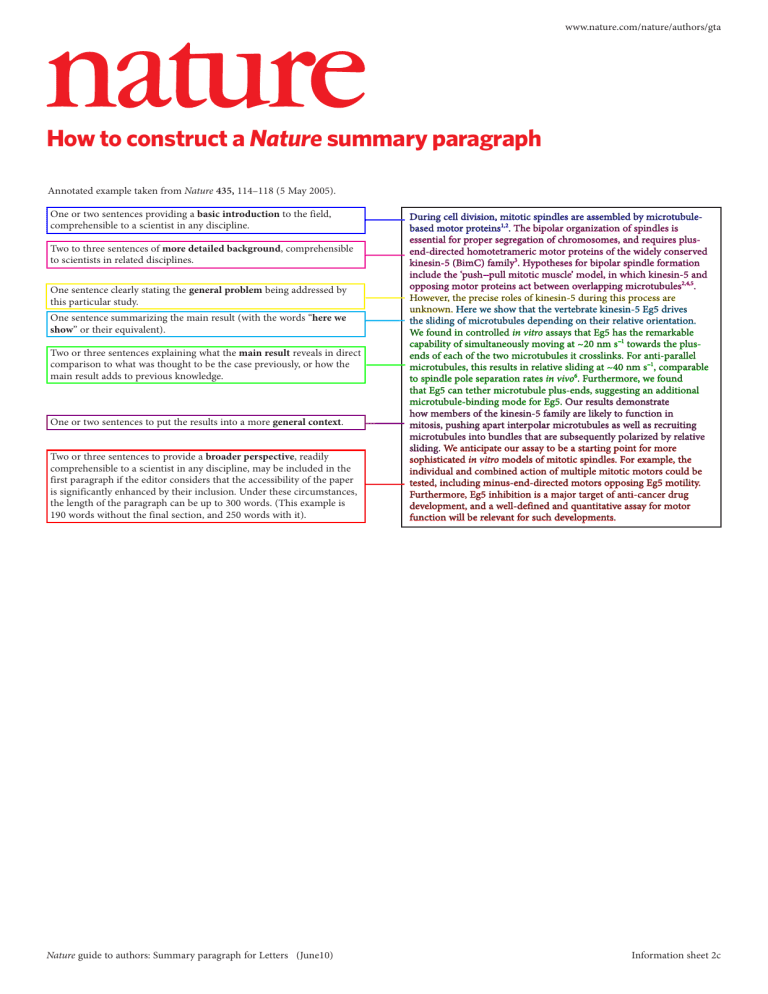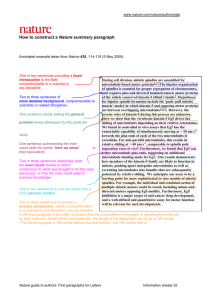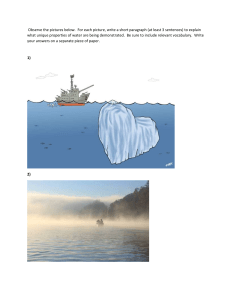
www.nature.com/nature/authors/gta How to construct a Nature summary paragraph Annotated example taken from Nature 435, 114–118 (5 May 2005). One or two sentences providing a basic introduction to the field, comprehensible to a scientist in any discipline. Two to three sentences of more detailed background, comprehensible to scientists in related disciplines. One sentence clearly stating the general problem being addressed by this particular study. One sentence summarizing the main result (with the words “here we show” or their equivalent). Two or three sentences explaining what the main result reveals in direct comparison to what was thought to be the case previously, or how the main result adds to previous knowledge. One or two sentences to put the results into a more general context. Two or three sentences to provide a broader perspective, readily comprehensible to a scientist in any discipline, may be included in the first paragraph if the editor considers that the accessibility of the paper is significantly enhanced by their inclusion. Under these circumstances, the length of the paragraph can be up to 300 words. (This example is 190 words without the final section, and 250 words with it). Nature guide to authors: Summary paragraph for Letters (June10) During cell division, mitotic spindles are assembled by microtubulebased motor proteins1,2. The bipolar organization of spindles is essential for proper segregation of chromosomes, and requires plusend-directed homotetrameric motor proteins of the widely conserved kinesin-5 (BimC) family3. Hypotheses for bipolar spindle formation include the ‘push−pull mitotic muscle’ model, in which kinesin-5 and opposing motor proteins act between overlapping microtubules2,4,5. However, the precise roles of kinesin-5 during this process are unknown. Here we show that the vertebrate kinesin-5 Eg5 drives the sliding of microtubules depending on their relative orientation. We found in controlled in vitro assays that Eg5 has the remarkable capability of simultaneously moving at ~20 nm s–1 towards the plusends of each of the two microtubules it crosslinks. For anti-parallel microtubules, this results in relative sliding at ~40 nm s–1, comparable to spindle pole separation rates in vivo6. Furthermore, we found that Eg5 can tether microtubule plus-ends, suggesting an additional microtubule-binding mode for Eg5. Our results demonstrate how members of the kinesin-5 family are likely to function in mitosis, pushing apart interpolar microtubules as well as recruiting microtubules into bundles that are subsequently polarized by relative sliding. We anticipate our assay to be a starting point for more sophisticated in vitro models of mitotic spindles. For example, the individual and combined action of multiple mitotic motors could be tested, including minus-end-directed motors opposing Eg5 motility. Furthermore, Eg5 inhibition is a major target of anti-cancer drug development, and a well-defined and quantitative assay for motor function will be relevant for such developments. Information sheet 2c

